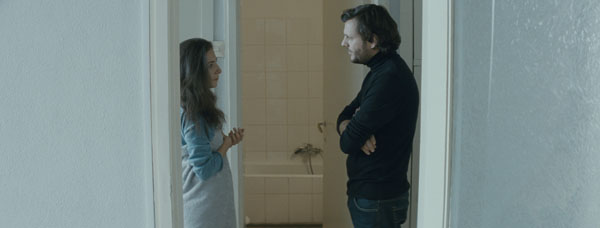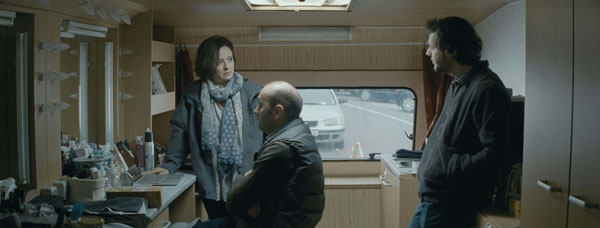Corneliu Porumboiu’s “Cannes Camera d’Or-winning debut 12:08 East of Bucharest and its follow-up, Police, Adjective, both investigated words and meanings but his latest explores film grammar instead,” writes Boyd van Hoeij in the Hollywood Reporter. When Evening Falls on Bucharest or Metabolism (Cand se lasa seara peste Bucuresti sau metabolism) “world premiered at Locarno, where it was one of the few new films shot and shown on 35mm. Porumboiu opens with a take that lasts an entire roll of film and was shot from the backseat of a car in which the driver turns out to be a director, Paul (Bogdan Dumitrache). His passenger’s Alina (Diana Avramut), an actress with a small role in the film Paul’s in the middle of shooting. He explains to her that he shoots on film because it imposes a limit of 11 minutes for a single shot because a roll of film can’t contain more—with digital he wouldn’t have any limits and would be lost, though the result might be even more life-like. Clearly, Porumboiu directly addresses the audience through Paul here, as the character explains things in a carefully timed shot that serves to illustrate his point.”
“Whether it is a real life story—as some gossips would like to imply—or a commonplace event that is often taken for granted, the plot,” notes Dan Fainaru in Screen Daily, “spread over a period of two days, recounts the brief, loveless, affair” between Paul and Alina. “Shot in bland, nondescript surroundings, whether in a car, a flat, a restaurant, a street corner or a hotel lobby, engaging in long pseudo-philosophical conversations which should fill up the void separating two persons who have very little in common beyond the ritual of passionless sex, this disillusioned image of behind-the-scenes movie action makes no concessions with either one of its two protagonists or with the entire process of filmmaking as a whole.”
Noting that the film’s “composed of something like 17 shots (some viewers have asserted that it has even fewer),” Indiewire‘s Eric Kohn adds that the “performances are key to making sequences like this hold together. Paul himself is a finely realized creation, the sort of aspiring visionary lost in his pretensions one might find in the cinema of Korean director Hong Sang-soo—or, for that matter, Joe Swanberg.”
For Michael Pattison, writing at the House Next Door, “the last thing we needed from a director as appreciably talented as Porumboiu was a kind of mission statement—much less a retroactive one. His feel for the dialectic remains, but what does his film say about artistry that others, such as those by Abbas Kiarostami and, more recently, Nuri Bilge Ceylan, haven’t already articulated?”
Update: “The slow-burning comedy of Corneliu Porumboiu, dryer than toast and strictly intellectual, can be very rewarding if limited—but indeed, limitations are this film’s foremost concern, both in form and content,” writes Adam Cook in the Notebook. “There’s an awareness in the film of the Romanian New Wave, with Porumboiu poking fun at this master shot, long take style, appropriating it to anemically cinematic settings and scenes, and to a reflexive discussion of itself. The technique is a conceptual exercise that can really go nowhere. What does it add to cinema? Nothing; but When Evening Falls on Bucharest is a sort of perfect record of a strange time in the world of cinema where the rules of the game stay the same even as the game itself changes, and this thing we call cinephilia clings to itself, lonely and insecure—an anticipation of a post-cinema cinephilia.”
Updates, 8/14: “Porumboiu so carefully intellectualizes every outwardly inconsequential exchange that the picture has no room to breathe,” finds Jay Weissberg in Variety.
“Porumboiu’s blueprint for comedy catharsis has become the dominant model of Romanian cinema, almost a rite of passage for the country’s budding filmmakers to experience as they find their voice,” writes Ronan Doyle at Criticwire. “It’s via the witty joie de vivre of How I Celebrated the End of the World that Catalin Mitulescu moved on to tackle the youth of Loverboy. The modern family drama of Radu Muntean‘s Boogie and Tuesday, After Christmas might never have arrived without the army-changeover absurdity of The Paper Will Be Blue…. The most entertaining and illuminating of [Metabolism‘s] mere sixteen shots sees the filmmaker playing an endoscopy DVD to a doctor for a second opinion. It’s no great stretch to say that Porumboiu is showing this character to have literally put a camera up his ass. Here is a director who has done anything but: underappreciated at the crest of the Romanian New Wave, Porumboiu has led the charge in addressing the nation’s dark past and finding in it enough light to accept it for what it was. His comedy is catharsis for his country; in the bowels of history, his camera has found the future.”
Update, 8/20: At Filmlinc Daily, Michael Pattison argues that “a filmmaker as demonstrably talented as Porumboiu doesn’t have to justify his sensibilities to anyone. Whereas East of Bucharest and Police, Adjective were unique and distinct contributions to their respective genres (a network television comedy, a minimalist policier), When Evening Falls unfolds like a navel-gazing thesis. Such an inward turn a mere three films into his career is by Porumboiu’s standards a disappointment.”
Locarno 2013 Index. For news and tips throughout the day every day, follow @KeyframeDaily on Twitter and/or the RSS feed. Get Keyframe Daily in your inbox by signing in at fandor.com/daily.





